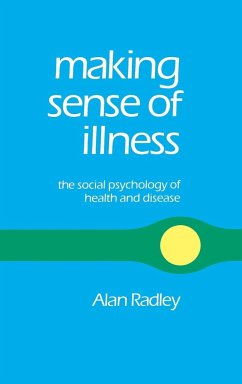`This book is a "must read" for all students of health psychology, and will be of considerable interest and value to others interested in the field. The discipline has not involved itself with the central issues of this book so far, but Radley has now brought this material together in an accessible way, offering important new perspectives, and directions for the discipline. This book goes a long way towards making sense for, and of, health psychology' - Journal of Health Psychology `Radley's book is about the experience of falling ill and the meanings and behaviours that organise this experience... Radley is highly critical of health psychology which he sees as an extension of the medical model... much material in this book is guided by
medical-sociological ideas, theories and methods. For example, considerable space is devoted to discussion of sick role theory and the social construction of health and disease... Making Sense of Illness serves as a useful reminder that the social scientific study of health and illness is neither simple nor value-free' - Health Psychology Update `This book explores the kinds of processes which shape people's perceptions and experiences of illness. However, of equal importance is its emphasis on how people define ideas about health. In order to unravel the complexities of these processes, Radley approaches the issues from a number of theoretical perspectives. In doing so, he provides a comprehensive overview of the way bodily experiences of health and disease in everyday life are given meaning in a society dominated by the biomedical model of well-being... He draws on studies from a variety of disciplines including medical sociology, health psychology and medical anthropology. By addressing the issues in this way, he clarifies how the kind of research methodology adopted reveals different kinds of truths... the book provides a valuable and critical introduction to the social and psychological consideration of health and illness. Furthermore, given the increasing interest in user perspectives in health care provision, it will be useful reading for all those interested in health promotion and how ideas of health and illness are constructed' - Social Sciences in Health `In discussing the psychological concepts of health and illness, the wider sociological issues that will affect people's thinking about their health and ultimately influence their health and illness related behaviour, this book is a useful broad introduction. For example, the issues raised in the chapter on gender are of vital importance to those who might not have considered them before... For students and particularly for health workers new to health psychology and related areas, this book would help stimulate a great deal of thought' - Psychology, Health & Medicine `The author does an excellent job throughout the book in keeping the reader focused on the individual's consciousness of the illness process... The perspective taken is clearly one of social constructionism... Radley does a good job of taking the reader through the steps involved from the earliest stages of recognizing symptoms and falling ill through the interaction with a medical professional... I would hasten to applaud the author for his thorough discussion of the psychological agenda for the person with a chronic illness.. [and] a lucid description of how we have been seduced by the concept of stress as a powerful variable in determining the sequence leading to illness... This book provides a strong overview of a very important topic. Beyond the fact that everyone has to make sense of illness at various points in life, with the graying of the World War II baby boomers, increasing numbers of Americans will be facing this issue. Perhaps the best advice to that group, as well as to the rest of us, is captured in Radley's closing sentence to his book, "we try to be well, strive to avoid falling sick or ultimately consent to bear illness with what grace and fortitude we can muster". These mortal lessons occupy our minds as we navigate through life, and this worthwhile book provides many insights into the journey' - Contemporary Psychology `It is hard to imagine a more important project for nurses than trying to understand how people make sense of health and illness. This is a book that will certainly be of assistance in achieving such understanding. The book highlights the various theoretical lenses through which our understanding of health and illness might be viewed, and the author manages to address many salient areas such as acute and chronic illness, health promotion, stress and social support... It is written in a clear and accessible style but does not trivialise the issues, and the author provdes a wealth of suggestions for further reading... a worthwhile purchase for any nurse' - Nursing Times `The natural scientific approach... has been the dominant perspective within health psychology... alternative perspectives, particularly those from the social sciences, are stated eloquently by Alan Radley... The book is organized in a series of chapters which consider such issues as public perceptions/beliefs, falling sick, relationships with professionals, gender issues, chronic illness, stress and health promotion. Each chapter is not simply a summary of the literature, but rather a coherent integration of social and psychological studies of health and illness... the book is to be strongly recommended as an alternative to the dominant natural scientific perspective' - Le Psychologue Canadien de la Sant[ac]e
















